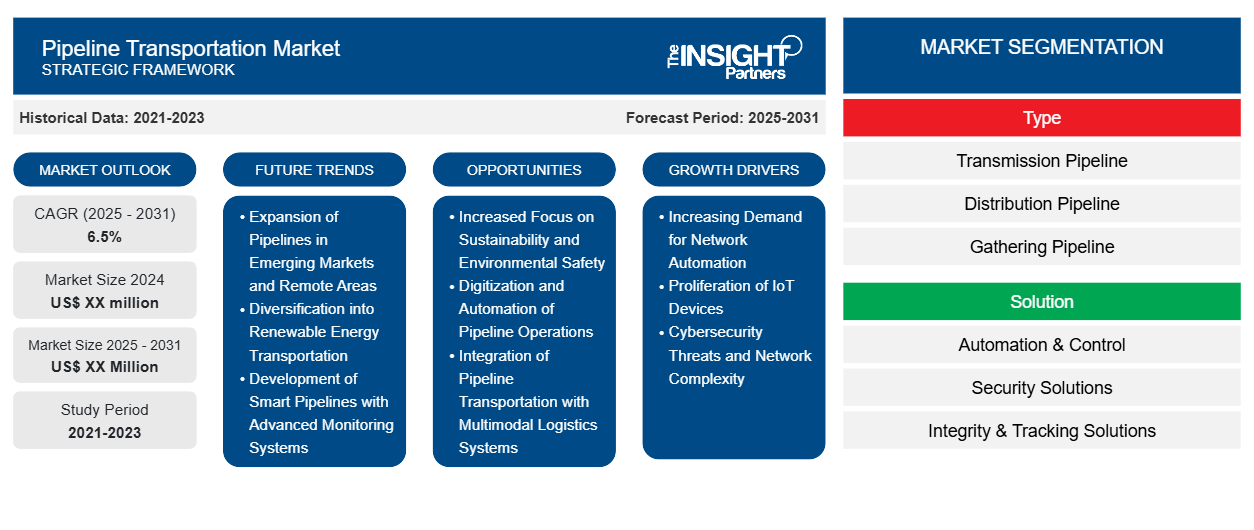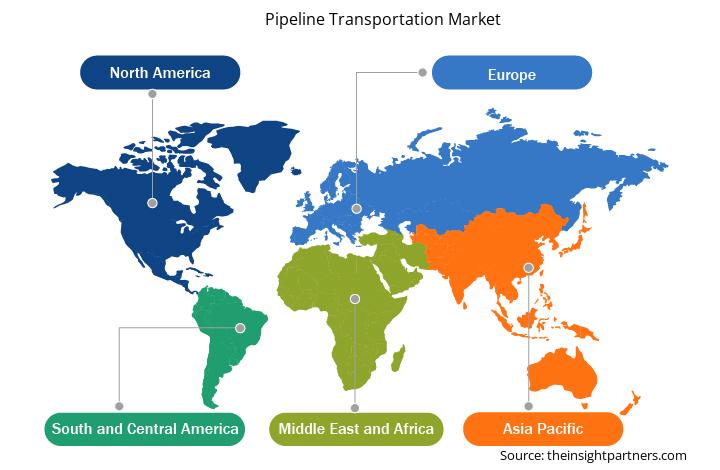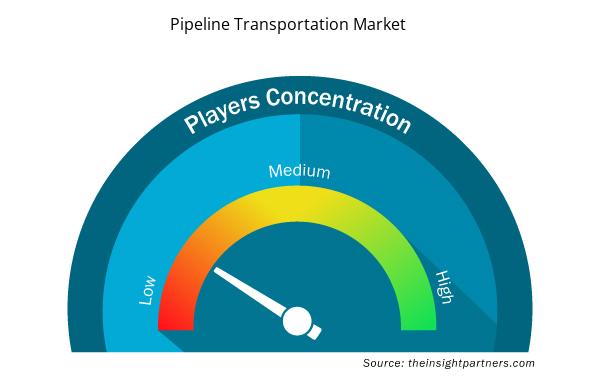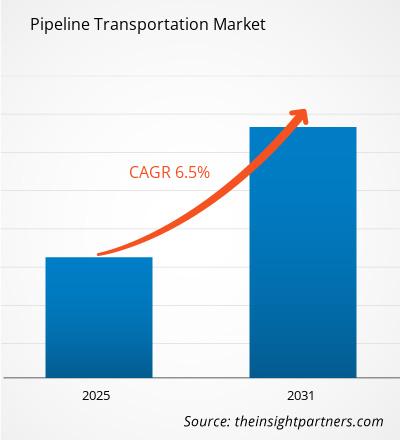The Pipeline Transportation Market is expected to register a CAGR of 6.5% from 2025 to 2031, with a market size expanding from US$ XX million in 2024 to US$ XX Million by 2031.
The report is segmented by Type (Transmission Pipeline, Distribution Pipeline, Gathering Pipeline);Solution (Automation & Control, Security Solutions, Integrity & Tracking Solutions, Network Communication Solution, Others);Service (Maintenance & Support Services, Managed Services, Consulting Services);Application (Oil & Gas, Water, Coal, Others). The global analysis is further broken-down at regional level and major countries. The Report Offers the Value in USD for the above analysis and segments.
Purpose of the Report
The report Pipeline Transportation Market by The Insight Partners aims to describe the present landscape and future growth, top driving factors, challenges, and opportunities. This will provide insights to various business stakeholders, such as:
- Technology Providers/Manufacturers: To understand the evolving market dynamics and know the potential growth opportunities, enabling them to make informed strategic decisions.
- Investors: To conduct a comprehensive trend analysis regarding the market growth rate, market financial projections, and opportunities that exist across the value chain.
- Regulatory bodies: To regulate policies and police activities in the market with the aim of minimizing abuse, preserving investor trust and confidence, and upholding the integrity and stability of the market.
Pipeline Transportation Market Segmentation
Type
- Transmission Pipeline
- Distribution Pipeline
- Gathering Pipeline
Solution
- Automation & Control
- Security Solutions
- Integrity & Tracking Solutions
- Network Communication Solution
Service
- Maintenance & Support Services
- Managed Services
- Consulting Services
Application
- Oil & Gas
- Water
- Coal
Customize This Report To Suit Your Requirement
You will get customization on any report - free of charge - including parts of this report, or country-level analysis, Excel Data pack, as well as avail great offers and discounts for start-ups & universities
Pipeline Transportation Market: Strategic Insights

- Get Top Key Market Trends of this report.This FREE sample will include data analysis, ranging from market trends to estimates and forecasts.
Pipeline Transportation Market Growth Drivers
- Increasing Demand for Network Automation: As businesses expand and the complexity of IT infrastructures grow, there is a rising demand for network automation solutions. DDI (DNS, DHCP, and IP Address Management) solutions automate network operations, improving operational efficiency, reducing manual errors, and enabling scalability. This increased demand for automation in managing dynamic IP address environments directly drives the growth of the DDI market.
- Proliferation of IoT Devices: The rapid increase in connected devices, fueled by the Internet of Things (IoT), has significantly expanded the need for efficient IP address management. DDI solutions help manage a vast number of IP addresses, providing real-time data and minimizing downtime by automating IP allocation and ensuring network scalability, driving DDI market growth.
- . Cybersecurity Threats and Network Complexity: With rising cybersecurity threats and more complex networks, businesses require robust DNS, DHCP, and IP address management solutions for better control, visibility, and security. DDI solutions enhance network resilience, ensuring protection against DDoS attacks, DNS spoofing, and other vulnerabilities, which is a key driver for the market.
Pipeline Transportation Market Future Trends
- Expansion of Pipelines in Emerging Markets and Remote Areas: There is significant opportunity for growth in the pipeline transportation market through the expansion of pipelines in emerging markets and remote regions. As countries in Africa, Asia, and Latin America continue to develop their energy infrastructure to meet growing demand, pipelines offer an effective solution for transporting energy resources like natural gas and oil to urban centers. Additionally, the exploration of oil and gas reserves in remote locations such as the Arctic and deep-water regions creates an opportunity for the development of new pipeline routes. As these regions urbanize, the demand for reliable and cost-effective energy transportation will drive pipeline construction projects.
- Diversification into Renewable Energy Transportation: With the global shift toward renewable energy sources, pipeline companies have an opportunity to diversify their operations into the transportation of renewable energy resources, such as biofuels, hydrogen, and carbon dioxide for carbon capture and storage (CCS). As governments and industries transition to cleaner energy sources, the infrastructure for transporting these products via pipelines needs to be developed and expanded. This diversification presents a significant opportunity for the pipeline transportation market to adapt to evolving energy demands, opening up new avenues for growth in the green energy sector.
- Development of Smart Pipelines with Advanced Monitoring Systems: The increasing focus on the Internet of Things (IoT) and smart technologies presents opportunities for pipeline companies to develop "smart" pipelines that utilize sensors, real-time monitoring, and data analytics to optimize performance. These smart pipelines can detect leaks, corrosion, and irregularities more efficiently, improving safety and reducing environmental risks. Furthermore, the integration of predictive maintenance and data-driven decision-making tools can significantly reduce operational downtime and maintenance costs. The demand for enhanced pipeline monitoring systems, driven by the need for safer, more reliable transportation solutions, presents a strong opportunity for technological innovation in the pipeline transportation market
Pipeline Transportation Market Opportunities
- Increased Focus on Sustainability and Environmental Safety: Environmental concerns, such as oil spills, gas leaks, and the overall ecological impact of pipeline operations, have led to a growing trend in the pipeline transportation market toward enhanced sustainability and safety measures. Pipeline operators are adopting greener practices, such as using eco-friendly materials for construction and improving the efficiency of energy transportation to reduce emissions. Moreover, increasing public awareness and regulatory pressure are pushing the industry to adopt more stringent environmental standards. This trend emphasizes the need for pipeline operators to balance energy transportation with sustainability, driving investments in green technologies and eco-friendly practices.
- Digitization and Automation of Pipeline Operations: The pipeline transportation industry is undergoing a significant transformation with the integration of digitization and automation. The use of digital twins, predictive analytics, and AI is enabling pipeline operators to optimize operations, reduce maintenance costs, and enhance safety. Automation in pipeline operations, such as the use of robots for inspection and maintenance tasks, is also improving efficiency and reducing the need for manual labor. The trend of increasing digitization allows for more precise monitoring, better decision-making, and a more efficient response to potential issues, which is vital for ensuring the smooth operation of pipeline systems.
- Integration of Pipeline Transportation with Multimodal Logistics Systems: As businesses strive for more integrated and cost-effective supply chains, there is a growing trend to combine pipeline transportation with other forms of logistics, such as rail, road, and maritime transport. This multimodal approach helps optimize the movement of goods by using the most efficient transportation methods for different segments of the supply chain. The integration of pipelines with multimodal logistics systems ensures that energy resources can be transported seamlessly across regions and borders, improving connectivity, reducing transport costs, and ensuring timely delivery. This trend reflects the growing need for flexibility and efficiency in the global energy transport network
Pipeline Transportation Market Regional Insights
The regional trends and factors influencing the Pipeline Transportation Market throughout the forecast period have been thoroughly explained by the analysts at Insight Partners. This section also discusses Pipeline Transportation Market segments and geography across North America, Europe, Asia Pacific, Middle East and Africa, and South and Central America.

- Get the Regional Specific Data for Pipeline Transportation Market
Pipeline Transportation Market Report Scope
| Report Attribute | Details |
|---|---|
| Market size in 2024 | US$ XX million |
| Market Size by 2031 | US$ XX Million |
| Global CAGR (2025 - 2031) | 6.5% |
| Historical Data | 2021-2023 |
| Forecast period | 2025-2031 |
| Segments Covered |
By Type
|
| Regions and Countries Covered | North America
|
| Market leaders and key company profiles |
Pipeline Transportation Market Players Density: Understanding Its Impact on Business Dynamics
The Pipeline Transportation Market market is growing rapidly, driven by increasing end-user demand due to factors such as evolving consumer preferences, technological advancements, and greater awareness of the product's benefits. As demand rises, businesses are expanding their offerings, innovating to meet consumer needs, and capitalizing on emerging trends, which further fuels market growth.
Market players density refers to the distribution of firms or companies operating within a particular market or industry. It indicates how many competitors (market players) are present in a given market space relative to its size or total market value.
Major Companies operating in the Pipeline Transportation Market are:
- ABB
- Emerson Electric Co.
- ESRI
- FMC Technologies
- Rockwell Automation, Inc.
- Schneider Electric
Disclaimer: The companies listed above are not ranked in any particular order.

- Get the Pipeline Transportation Market top key players overview
Key Selling Points
- Comprehensive Coverage: The report comprehensively covers the analysis of products, services, types, and end users of the Pipeline Transportation Market, providing a holistic landscape.
- Expert Analysis: The report is compiled based on the in-depth understanding of industry experts and analysts.
- Up-to-date Information: The report assures business relevance due to its coverage of recent information and data trends.
- Customization Options: This report can be customized to cater to specific client requirements and suit the business strategies aptly.
The research report on the Pipeline Transportation Market can, therefore, help spearhead the trail of decoding and understanding the industry scenario and growth prospects. Although there can be a few valid concerns, the overall benefits of this report tend to outweigh the disadvantages.
- Historical Analysis (2 Years), Base Year, Forecast (7 Years) with CAGR
- PEST and SWOT Analysis
- Market Size Value / Volume - Global, Regional, Country
- Industry and Competitive Landscape
- Excel Dataset



Report Coverage
Revenue forecast, Company Analysis, Industry landscape, Growth factors, and Trends

Segment Covered
This text is related
to segments covered.

Regional Scope
North America, Europe, Asia Pacific, Middle East & Africa, South & Central America

Country Scope
This text is related
to country scope.
Frequently Asked Questions
The report can be delivered in PDF/PPT format; we can also share excel dataset based on the request.
ABB, Emerson Electric Co., ESRI, FMC Technologies, Rockwell Automation, Inc., Schneider Electric, Siemens, Trimble Navigation Limited, IDS GmbH, Baker Hughes, Halliburton, National Oilwell Varco, John Wood Group PLC
Diversification into Renewable Energy Transportation
Digitization and Automation of Pipeline Operations
The global Pipeline Transportation Market is expected to grow at a CAGR of 6.5% during the forecast period 2024 - 2031.

 Get Free Sample For
Get Free Sample For